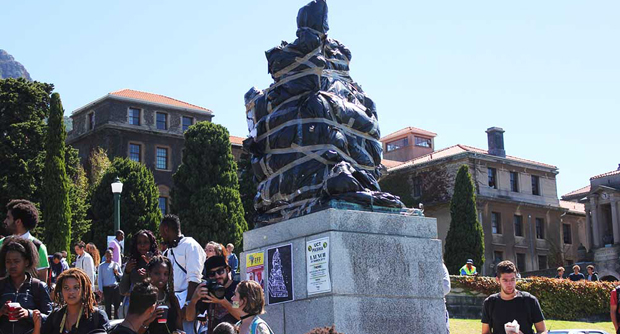An objection to a People Of Colour (POC)-only space at the University of Cape Town’s (UCT) Winter Decolonial School is shifting the attention from the objection of the school to white fragility, organisers of the school said.
From 24 to 30 June, UCT will host a Decolonial Winter School on topics relating to decolonial theory and practice. Hosted by activists, scholars and community organisations, it seeks to reimagine the teaching environment outside the traditional classroom and lecture theatre.
“It’s a historical moment,” organiser and student activist Alex Hotz said in an interview with The Daily Vox. She described the school as an important commitment from the university to change and transformation.
“UCT recognised the need to create a space within the university to talk about decolonisation,” she added.
The many faces of the decolonial struggle. #DecolonialSchool UCT 24-30 June 2018. pic.twitter.com/q02GBgcytV
– The Decolonial School (@DecolonialEdu) May 23, 2018
However, an hour-long POC supper break on the programme has caused controversy among white people and liberals who believe this move is unconstitutional and racist.
In a FAQ on Facebook, The Decolonial School describes the intended POC supper break as
“a space where black people can come together to communicate their experiences of the day without having to shelter white fragility.”
“There is safety in black-only spaces, resultant from the trauma and oppression of the past and present,” it said.
The space is important because the burden of decolonisation is on POC, Hotz said.
(Hotz prefers to refer to the political identity of those who are not white as Black people but for the purpose of this article we will use the term POC.)
However, the POC supper will not be allowed. Responding to pressure on the university to explain who was excluded with the term POC, the university said in a statement: “Entrance to UCT events may not be restricted on the basis of race. Our understanding is that the students & alumni arranging the event have been informed accordingly & have agreed that the programme wording will be changed.”
UCT notes inappropriate phrasing in winter school programme
UCT has noted the inclusion of the words “POC†in the programme of the Decolonised Winter School (DWS), scheduled for 24-30 June. The words are understood to be an abbreviated version of ‘people of colouR’. pic.twitter.com/pv65uYmsUs
– UCT (@UCT_news) June 21, 2018
“As usual white people have monopolised the discussion and come out in fire and fury around a POC supper space when they were dead silent about – and continue to be silent about – the privileges that they have received under apartheid and continue to receive as a result of apartheid and under colonialism,” said Hotz.
The school is being bombarded with tweets stating the benefits of colonialism and accusations that it is racist with no one condemning the racism displayed.
DoN’t give up guys! Keep fighting for racial segregation! Perhaps if you develop some kind of test for admission, it would help? I hear there was once such a thing, involved a pencil or something. Good luck! https://t.co/U4Sw2V3hEH
– Gareth van Onselen (@GvanOnselen) June 22, 2018
I hope they weren’t thinking of using plates or cutlery.
– Dave (@bravedave99) June 22, 2018
@DecolonialEdu why you using such colonial language.
– Simons Cat (@OrionTiger101) June 22, 2018
“What this does is put attention on white people, instead of on the programme and what we’re trying to do with the decolonial school,” Hotz said. “It’s taking away from the fact that this is a historical moment for the university and particularly UCT where Rhodes Must Fall was started and ignited a question around the decolonising of universities in South Africa,” she added.
“In the decolonial school we have academics deconstructing the constitution and how the constitution constructs racism to protect whiteness and not to see how racism is structural and systemic,” Hotz said. “It challenges white people who call Black people racist when we don’t have any systemic or structural power,” she added.
Hotz said she doesn’t expect anything from the university. We have a black vice-chancellor and more and more Black professors and academics, she said. “What we want is that whiteness and white supremacy does not make us as Black people pander to them at the university,” Hotz said.









